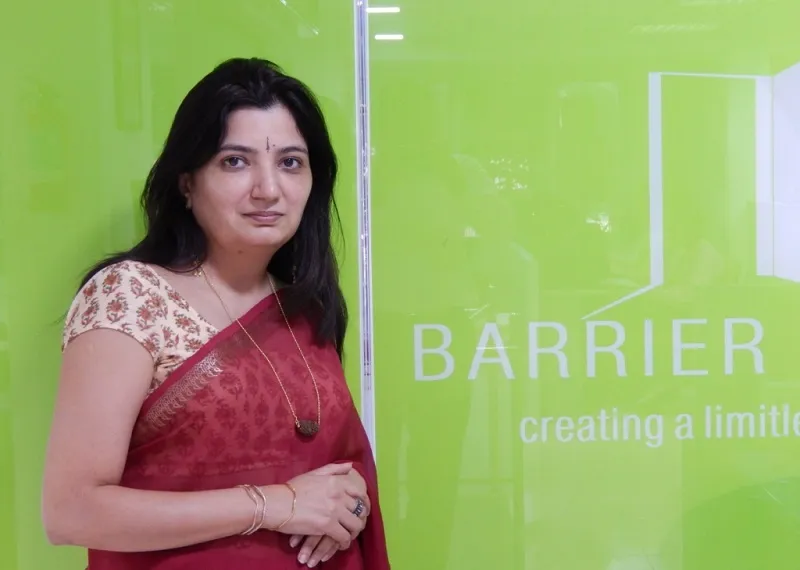How Shilpi Kapoor is making accessibility a new normal through technology
Shilpi Kapoor is a sociology graduate who started her career exporting silk furnishings. But she failed miserably at it. Later, she turned to technology, starting all over again as a remote-hacker for a US-based company. Shilpi recalls the day that transformed her life:
I managed to trace the hacker before my mentor (who used to work from the US) and I was pleasantly shocked. When I asked him the reason for the unusual delay, I discovered he was disabled neck down and relied on a ‘sip and puff’ device to work. That incident changed the way I perceived disability.
It was her mentor’s idea that inspired Shilpi to innovate technology for the benefit of the disabled, and she started the first-ever training centre for the visually impaired, but later shut it down as the idea of a non-profit wasn’t going down too well, financially. Using her past experiences and rich expertise, she finally founded the game-changer, BarrierBreak. A for-profit venture, the company is a pioneer in providing accessibility and assistive technology solutions that are successfully opening doors for people with disabilities by making organisations inclusive.

Shilpi explains,
In a country where one can’t change anything easily – be it healthcare or local transport, relying on technology which is ever-changing is only natural. BarrierBreak was founded on three basic principles – technology, hiring disabled (75 per cent of BarrierBreak’s employees are disabled), as a fair organisation shouldn’t believe in exclusion of any kind, and a for-profit model.
Since 2004, the company has worked with close to 200 companies across various verticals such as IT, healthcare, publishing as well as the government in 12 countries. Multi-national companies like Microsoft and Accenture have made significant inroads in making their offices disabled-friendly, thanks to Barrier Break.
Status of disability in India
According to Census 2011, approximately 2.21 per cent or 26.8 million people in India are disabled. Of these, 5.4 million are physically disabled, while there are 5.07 million people with hearing disabilities, and vision issues are faced by 5.05 million people. At the bottom are speech disability, affecting around two million, and mental illness, which also affects another two million.
Out of the overall figure, 54.51 per cent are literate and 63.66 per cent are unemployed.
However, the Planning Commission dismissed the above figures claiming that the actual figures are between five and six per cent only.
What are BarrierBreak’s offerings?
BarrierBreak has a holistic model that addresses all possible needs a company may have –
- Assistive technology products – From ensuring children with disabilities engage in fun activities to providing mouse alternatives for people with varying motor abilities, the company has over 50 products that cater to disabilities of all kinds. Assistive listening devices, Braille displayers, inclusive libraries, format tools and desktop magnifiers are some of the examples.
- Accessibility testing – By performing website and mobile accessibility testing, BarrierBreak ensures that every important company document and product adheres to international standards of being disabled-friendly.
- Accessible documents and media – This segment ensures that information is provided to a wide range of users by having accessible PDFs, providing captions, audio descriptions and sign language interpretation to news, educational and entertainment videos.
Shilpi well realises that accessibility isn’t merely providing solutions. It’s allowing every space to be disabled-friendly. And that’s where a critical segment – workshops – comes into the picture. BarrierBreak offers customised sessions for organisations and non-profits, and builds awareness on making an inclusive society possible.

Despite everything BarrierBreak has achieved, Shilpi says there’s still a long way to go,
The industry hasn’t yet accepted accessibility as a solution. Most companies only cater to the needs if it’s a mandate. And that’s not enough. We need to build a world where every person has access to everything.
Impact, lessons and creating a world of changemakers
A.S. Narayanan, Secretary, National Association of the Deaf, says,
Making communication accessible to deaf people is analogous to making them hearing. After all, deafness is a disability only when communication is a barrier but captions and signs remove that.
Narayanan’s testimonial is a microcosm of the impact BarrierBreak is making on every disabled individual, inclusive companies and the nation at large. But Shilpi is nowhere close to put a full-stop to her innovations.
She says,
There was a time when the cheapest mobile in the market was Rs 20,000. But today, one can buy it for as less as Rs 1,500. That kind of market hasn’t been created in India, which has a population of over two crore disabled people. And we are proof to that because even today most of our products are imported.
With an aim to enable the nation to perceive disability positively and create a market where technology can be optimised, Shilpi started Techshare – a national-level conference that focusses on creating a digitally-inclusive society. The conference is also an opportunity for entrepreneurs to innovate at an affordable cost across sectors such as finance, transportation, healthcare, education, to name a few, and showcase these technologies to the right people who can proliferate the idea.
Shilpi says, “When I started out there was no one to help me. I largely learnt from my own failures. Techshare is a platform that helps smoothen that hurdle. It enables entrepreneurs to start looking at people with disabilities as a customer base. We are talking about creating an inclusive society for 100 million people worldwide. It just cannot be ignored further.”







